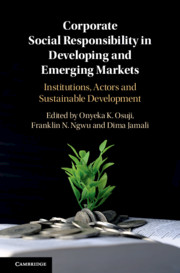 Corporate Social Responsibility in Developing and Emerging Markets
Corporate Social Responsibility in Developing and Emerging Markets Book contents
- Corporate Social Responsibility in Developing and Emerging Markets
- Corporate Social Responsibility in Developing and Emerging Markets
- Copyright page
- Dedication
- Contents
- Figures
- Tables
- Notes on Contributors
- Foreword
- Endorsement
- Preface
- Table of Cases
- Table of Legislation
- 1 Introduction to Corporate Social Responsibility in Developing and Emerging Markets: Institutions, Actors and Sustainable Development
- Part I Institutions, CSR Conceptualizations and Sustainable Development
- Part II CSR and Sustainable Development Cross-Country Studies
- Part III Normative and Utility Perspectives
- 14 Islamic Finance, Sustainable Development and Developing Countries: Linkages and Potential
- 15 Developing Countries’ Business Schools and Socially Conscious Business Leaders
- 16 Corporate Participation in Climate Change Mitigation in Developing Countries: ‘Green Capitalism’ as a Tool for Sustainable Development
- 17 Ethics Issues in Outsourcing to Emerging Markets: Theoretical Perspectives and Practices
- 18 Promoting Sustainability in Business and Management Education
- 19 Sustainable Finance, the Law and Stakeholders: Towards Responsible Social Movements
- 20 Sustainable Consumption, Consumer Protection and Sustainable Development: Unbundling Institutional Septet for Developing Economies
- 21 Corporate Social Responsibility and Sustainable Development in Developing and Emerging Markets: Looking Forward
- References
17 - Ethics Issues in Outsourcing to Emerging Markets: Theoretical Perspectives and Practices
from Part III - Normative and Utility Perspectives
Published online by Cambridge University Press: 18 December 2019
- Corporate Social Responsibility in Developing and Emerging Markets
- Corporate Social Responsibility in Developing and Emerging Markets
- Copyright page
- Dedication
- Contents
- Figures
- Tables
- Notes on Contributors
- Foreword
- Endorsement
- Preface
- Table of Cases
- Table of Legislation
- 1 Introduction to Corporate Social Responsibility in Developing and Emerging Markets: Institutions, Actors and Sustainable Development
- Part I Institutions, CSR Conceptualizations and Sustainable Development
- Part II CSR and Sustainable Development Cross-Country Studies
- Part III Normative and Utility Perspectives
- 14 Islamic Finance, Sustainable Development and Developing Countries: Linkages and Potential
- 15 Developing Countries’ Business Schools and Socially Conscious Business Leaders
- 16 Corporate Participation in Climate Change Mitigation in Developing Countries: ‘Green Capitalism’ as a Tool for Sustainable Development
- 17 Ethics Issues in Outsourcing to Emerging Markets: Theoretical Perspectives and Practices
- 18 Promoting Sustainability in Business and Management Education
- 19 Sustainable Finance, the Law and Stakeholders: Towards Responsible Social Movements
- 20 Sustainable Consumption, Consumer Protection and Sustainable Development: Unbundling Institutional Septet for Developing Economies
- 21 Corporate Social Responsibility and Sustainable Development in Developing and Emerging Markets: Looking Forward
- References
Summary
Offshoring has become a popular practice for multinational corporations (MNCs), with emerging markets being regarded as attractive locations. Although offshore outsourcing has economic benefits, it also involves several ethical issues, such as poor working conditions, child labour and environmental pollution. To identify implications for how to establish ethical practices in MNCs’ offshoring operations, we discuss theoretical perspectives (i.e., institutional, instrumental and normative) on MNCs’ motivations for being socially and environmentally responsible. Based on a review of these perspectives, this chapter provides practical guidelines for both MNCs and policymakers, including (1) re-designing governance, (2) establishing industry-level action and (3) developing institutional capacity. Developing both public (e.g., government regulation) and private (e.g., corporate code of conduct) governance mechanisms is important. Also, MNCs should take collective action at the industry level. Lastly, MNCs should provide resources and capacity to outsourcing companies and local communities to contribute to alleviating ethical concerns in emerging markets.
Keywords
- Type
- Chapter
- Information
- Corporate Social Responsibility in Developing and Emerging MarketsInstitutions, Actors and Sustainable Development, pp. 336 - 347Publisher: Cambridge University PressPrint publication year: 2019


